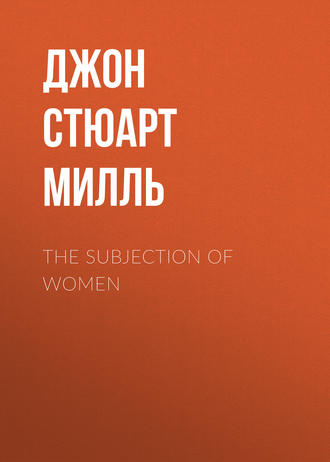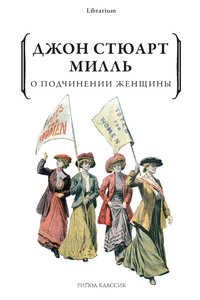 полная версия
полная версияThe Subjection of Women
Let us at first make entire abstraction of all psychological considerations tending to show, that any of the mental differences supposed to exist between women and men are but the natural effect of the differences in their education and circumstances, and indicate no radical difference, far less radical inferiority, of nature. Let us consider women only as they already are, or as they are known to have been; and the capacities which they have already practically shown. What they have done, that at least, if nothing else, it is proved that they can do. When we consider how sedulously they are all trained away from, instead of being trained towards, any of the occupations or objects reserved for men, it is evident that I am taking a very humble ground for them, when I rest their case on what they have actually achieved. For, in this case, negative evidence is worth little, while any positive evidence is conclusive. It cannot be inferred to be impossible that a woman should be a Homer, or an Aristotle, or a Michael Angelo, or a Beethoven, because no woman has yet actually produced works comparable to theirs in any of those lines of excellence. This negative fact at most leaves the question uncertain, and open to psychological discussion. But it is quite certain that a woman can be a Queen Elizabeth, or a Deborah, or a Joan of Arc, since this is not inference, but fact. Now it is a curious consideration, that the only things which the existing law excludes women from doing, are the things which they have proved that they are able to do. There is no law to prevent a woman from having written all the plays of Shakspeare, or composed all the operas of Mozart. But Queen Elizabeth or Queen Victoria, had they not inherited the throne, could not have been intrusted with the smallest of the political duties, of which the former showed herself equal to the greatest.
If anything conclusive could be inferred from experience, without psychological analysis, it would be that the things which women are not allowed to do are the very ones for which they are peculiarly qualified; since their vocation for government has made its way, and become conspicuous, through the very few opportunities which have been given; while in the lines of distinction which apparently were freely open to them, they have by no means so eminently distinguished themselves. We know how small a number of reigning queens history presents, in comparison with that of kings. Of this smaller number a far larger proportion have shown talents for rule; though many of them have occupied the throne in difficult periods. It is remarkable, too, that they have, in a great number of instances, been distinguished by merits the most opposite to the imaginary and conventional character of women: they have been as much remarked for the firmness and vigour of their rule, as for its intelligence. When, to queens and empresses, we add regents, and viceroys of provinces, the list of women who have been eminent rulers of mankind swells to a great length.2 This fact is so undeniable, that some one, long ago, tried to retort the argument, and turned the admitted truth into an additional insult, by saying that queens are better than kings, because under kings women govern, but under queens, men.
It may seem a waste of reasoning to argue against a bad joke; but such things do affect people's minds; and I have heard men quote this saying, with an air as if they thought that there was something in it. At any rate, it will serve as well as anything else for a starting point in discussion. I say, then, that it is not true that under kings, women govern. Such cases are entirely exceptional: and weak kings have quite as often governed ill through the influence of male favourites, as of female. When a king is governed by a woman merely through his amatory propensities, good government is not probable, though even then there are exceptions. But French history counts two kings who have voluntarily given the direction of affairs during many years, the one to his mother, the other to his sister: one of them, Charles VIII., was a mere boy, but in doing so he followed the intentions of his father Louis XI., the ablest monarch of his age. The other, Saint Louis, was the best, and one of the most vigorous rulers, since the time of Charlemagne. Both these princesses ruled in a manner hardly equalled by any prince among their contemporaries. The emperor Charles the Fifth, the most politic prince of his time, who had as great a number of able men in his service as a ruler ever had, and was one of the least likely of all sovereigns to sacrifice his interest to personal feelings, made two princesses of his family successively Governors of the Netherlands, and kept one or other of them in that post during his whole life, (they were afterwards succeeded by a third). Both ruled very successfully, and one of them, Margaret of Austria, was one of the ablest politicians of the age. So much for one side of the question. Now as to the other. When it is said that under queens men govern, is the same meaning to be understood as when kings are said to be governed by women? Is it meant that queens choose as their instruments of government, the associates of their personal pleasures? The case is rare even with those who are as unscrupulous on the latter point as Catherine II.: and it is not in these cases that the good government, alleged to arise from male influence, is to be found. If it be true, then, that the administration is in the hands of better men under a queen than under an average king, it must be that queens have a superior capacity for choosing them; and women must be better qualified than men both for the position of sovereign, and for that of chief minister; for the principal business of a prime minister is not to govern in person, but to find the fittest persons to conduct every department of public affairs. The more rapid insight into character, which is one of the admitted points of superiority in women over men, must certainly make them, with anything like parity of qualifications in other respects, more apt than men in that choice of instruments, which is nearly the most important business of every one who has to do with governing mankind. Even the unprincipled Catherine de' Medici could feel the value of a Chancellor de l'Hôpital. But it is also true that most great queens have been great by their own talents for government, and have been well served precisely for that reason. They retained the supreme direction of affairs in their own hands: and if they listened to good advisers, they gave by that fact the strongest proof that their judgment fitted them for dealing with the great questions of government.
Is it reasonable to think that those who are fit for the greater functions of politics, are incapable of qualifying themselves for the less? Is there any reason in the nature of things, that the wives and sisters of princes should, whenever called on, be found as competent as the princes themselves to their business, but that the wives and sisters of statesmen, and administrators, and directors of companies, and managers of public institutions, should be unable to do what is done by their brothers and husbands? The real reason is plain enough; it is that princesses, being more raised above the generality of men by their rank than placed below them by their sex, have never been taught that it was improper for them to concern themselves with politics; but have been allowed to feel the liberal interest natural to any cultivated human being, in the great transactions which took place around them, and in which they might be called on to take a part. The ladies of reigning families are the only women who are allowed the same range of interests and freedom of development as men; and it is precisely in their case that there is not found to be any inferiority. Exactly where and in proportion as women's capacities for government have been tried, in that proportion have they been found adequate.
This fact is in accordance with the best general conclusions which the world's imperfect experience seems as yet to suggest, concerning the peculiar tendencies and aptitudes characteristic of women, as women have hitherto been. I do not say, as they will continue to be; for, as I have already said more than once, I consider it presumption in any one to pretend to decide what women are or are not, can or cannot be, by natural constitution. They have always hitherto been kept, as far as regards spontaneous development, in so unnatural a state, that their nature cannot but have been greatly distorted and disguised; and no one can safely pronounce that if women's nature were left to choose its direction as freely as men's, and if no artificial bent were attempted to be given to it except that required by the conditions of human society, and given to both sexes alike, there would be any material difference, or perhaps any difference at all, in the character and capacities which would unfold themselves. I shall presently show, that even the least contestable of the differences which now exist, are such as may very well have been produced merely by circumstances, without any difference of natural capacity. But, looking at women as they are known in experience, it may be said of them, with more truth than belongs to most other generalizations on the subject, that the general bent of their talents is towards the practical. This statement is conformable to all the public history of women, in the present and the past. It is no less borne out by common and daily experience. Let us consider the special nature of the mental capacities most characteristic of a woman of talent. They are all of a kind which fits them for practice, and makes them tend towards it. What is meant by a woman's capacity of intuitive perception? It means, a rapid and correct insight into present fact. It has nothing to do with general principles. Nobody ever perceived a scientific law of nature by intuition, nor arrived at a general rule of duty or prudence by it. These are results of slow and careful collection and comparison of experience; and neither the men nor the women of intuition usually shine in this department, unless, indeed, the experience necessary is such as they can acquire by themselves. For what is called their intuitive sagacity makes them peculiarly apt in gathering such general truths as can be collected from their individual means of observation. When, consequently, they chance to be as well provided as men are with the results of other people's experience, by reading and education, (I use the word chance advisedly, for, in respect to the knowledge that tends to fit them for the greater concerns of life, the only educated women are the self-educated) they are better furnished than men in general with the essential requisites of skilful and successful practice. Men who have been much taught, are apt to be deficient in the sense of present fact; they do not see, in the facts which they are called upon to deal with, what is really there, but what they have been taught to expect. This is seldom the case with women of any ability. Their capacity of “intuition” preserves them from it. With equality of experience and of general faculties, a woman usually sees much more than a man of what is immediately before her. Now this sensibility to the present, is the main quality on which the capacity for practice, as distinguished from theory, depends. To discover general principles, belongs to the speculative faculty: to discern and discriminate the particular cases in which they are and are not applicable, constitutes practical talent: and for this, women as they now are have a peculiar aptitude. I admit that there can be no good practice without principles, and that the predominant place which quickness of observation holds among a woman's faculties, makes her particularly apt to build over-hasty generalizations upon her own observation; though at the same time no less ready in rectifying those generalizations, as her observation takes a wider range. But the corrective to this defect, is access to the experience of the human race; general knowledge – exactly the thing which education can best supply. A woman's mistakes are specifically those of a clever self-educated man, who often sees what men trained in routine do not see, but falls into errors for want of knowing things which have long been known. Of course he has acquired much of the pre-existing knowledge, or he could not have got on at all; but what he knows of it he has picked up in fragments and at random, as women do.
But this gravitation of women's minds to the present, to the real, to actual fact, while in its exclusiveness it is a source of errors, is also a most useful counteractive of the contrary error. The principal and most characteristic aberration of speculative minds as such, consists precisely in the deficiency of this lively perception and ever-present sense of objective fact. For want of this, they often not only overlook the contradiction which outward facts oppose to their theories, but lose sight of the legitimate purpose of speculation altogether, and let their speculative faculties go astray into regions not peopled with real beings, animate or inanimate, even idealized, but with personified shadows created by the illusions of metaphysics or by the mere entanglement of words, and think these shadows the proper objects of the highest, the most transcendant, philosophy. Hardly anything can be of greater value to a man of theory and speculation who employs himself not in collecting materials of knowledge by observation, but in working them up by processes of thought into comprehensive truths of science and laws of conduct, than to carry on his speculations in the companionship, and under the criticism, of a really superior woman. There is nothing comparable to it for keeping his thoughts within the limits of real things, and the actual facts of nature. A woman seldom runs wild after an abstraction. The habitual direction of her mind to dealing with things as individuals rather than in groups, and (what is closely connected with it) her more lively interest in the present feelings of persons, which makes her consider first of all, in anything which claims to be applied to practice, in what manner persons will be affected by it – these two things make her extremely unlikely to put faith in any speculation which loses sight of individuals, and deals with things as if they existed for the benefit of some imaginary entity, some mere creation of the mind, not resolvable into the feelings of living beings. Women's thoughts are thus as useful in giving reality to those of thinking men, as men's thoughts in giving width and largeness to those of women. In depth, as distinguished from breadth, I greatly doubt if even now, women, compared with men, are at any disadvantage.
If the existing mental characteristics of women are thus valuable even in aid of speculation, they are still more important, when speculation has done its work, for carrying out the results of speculation into practice. For the reasons already given, women are comparatively unlikely to fall into the common error of men, that of sticking to their rules in a case whose specialities either take it out of the class to which the rules are applicable, or require a special adaptation of them. Let us now consider another of the admitted superiorities of clever women, greater quickness of apprehension. Is not this pre-eminently a quality which fits a person for practice? In action, everything continually depends upon deciding promptly. In speculation, nothing does. A mere thinker can wait, can take time to consider, can collect additional evidence; he is not obliged to complete his philosophy at once, lest the opportunity should go by. The power of drawing the best conclusion possible from insufficient data is not indeed useless in philosophy; the construction of a provisional hypothesis consistent with all known facts is often the needful basis for further inquiry. But this faculty is rather serviceable in philosophy, than the main qualification for it: and, for the auxiliary as well as for the main operation, the philosopher can allow himself any time he pleases. He is in no need of the capacity of doing rapidly what he does; what he rather needs is patience, to work on slowly until imperfect lights have become perfect, and a conjecture has ripened into a theorem. For those, on the contrary, whose business is with the fugitive and perishable – with individual facts, not kinds of facts – rapidity of thought is a qualification next only in importance to the power of thought itself. He who has not his faculties under immediate command, in the contingencies of action, might as well not have them at all. He may be fit to criticize, but he is not fit to act. Now it is in this that women, and the men who are most like women, confessedly excel. The other sort of man, however pre-eminent may be his faculties, arrives slowly at complete command of them: rapidity of judgment and promptitude of judicious action, even in the things he knows best, are the gradual and late result of strenuous effort grown into habit.
It will be said, perhaps, that the greater nervous susceptibility of women is a disqualification for practice, in anything but domestic life, by rendering them mobile, changeable, too vehemently under the influence of the moment, incapable of dogged perseverance, unequal and uncertain in the power of using their faculties. I think that these phrases sum up the greater part of the objections commonly made to the fitness of women for the higher class of serious business. Much of all this is the mere overflow of nervous energy run to waste, and would cease when the energy was directed to a definite end. Much is also the result of conscious or unconscious cultivation; as we see by the almost total disappearance of “hysterics” and fainting fits, since they have gone out of fashion. Moreover, when people are brought up, like many women of the higher classes (though less so in our own country than in any other) a kind of hot-house plants, shielded from the wholesome vicissitudes of air and temperature, and untrained in any of the occupations and exercises which give stimulus and development to the circulatory and muscular system, while their nervous system, especially in its emotional department, is kept in unnaturally active play; it is no wonder if those of them who do not die of consumption, grow up with constitutions liable to derangement from slight causes, both internal and external, and without stamina to support any task, physical or mental, requiring continuity of effort. But women brought up to work for their livelihood show none of these morbid characteristics, unless indeed they are chained to an excess of sedentary work in confined and unhealthy rooms. Women who in their early years have shared in the healthful physical education and bodily freedom of their brothers, and who obtain a sufficiency of pure air and exercise in after-life, very rarely have any excessive susceptibility of nerves which can disqualify them for active pursuits. There is indeed a certain proportion of persons, in both sexes, in whom an unusual degree of nervous sensibility is constitutional, and of so marked a character as to be the feature of their organization which exercises the greatest influence over the whole character of the vital phenomena. This constitution, like other physical conformations, is hereditary, and is transmitted to sons as well as daughters; but it is possible, and probable, that the nervous temperament (as it is called) is inherited by a greater number of women than of men. We will assume this as a fact: and let me then ask, are men of nervous temperament found to be unfit for the duties and pursuits usually followed by men? If not, why should women of the same temperament be unfit for them? The peculiarities of the temperament are, no doubt, within certain limits, an obstacle to success in some employments, though an aid to it in others. But when the occupation is suitable to the temperament, and sometimes even when it is unsuitable, the most brilliant examples of success are continually given by the men of high nervous sensibility. They are distinguished in their practical manifestations chiefly by this, that being susceptible of a higher degree of excitement than those of another physical constitution, their powers when excited differ more than in the case of other people, from those shown in their ordinary state: they are raised, as it were, above themselves, and do things with ease which they are wholly incapable of at other times. But this lofty excitement is not, except in weak bodily constitutions, a mere flash, which passes away immediately, leaving no permanent traces, and incompatible with persistent and steady pursuit of an object. It is the character of the nervous temperament to be capable of sustained excitement, holding out through long continued efforts. It is what is meant by spirit. It is what makes the high-bred racehorse run without slackening speed till he drops down dead. It is what has enabled so many delicate women to maintain the most sublime constancy not only at the stake, but through a long preliminary succession of mental and bodily tortures. It is evident that people of this temperament are particularly apt for what may be called the executive department of the leadership of mankind. They are the material of great orators, great preachers, impressive diffusers of moral influences. Their constitution might be deemed less favourable to the qualities required from a statesman in the cabinet, or from a judge. It would be so, if the consequence necessarily followed that because people are excitable they must always be in a state of excitement. But this is wholly a question of training. Strong feeling is the instrument and element of strong self-control: but it requires to be cultivated in that direction. When it is, it forms not the heroes of impulse only, but those also of self-conquest. History and experience prove that the most passionate characters are the most fanatically rigid in their feelings of duty, when their passion has been trained to act in that direction. The judge who gives a just decision in a case where his feelings are intensely interested on the other side, derives from that same strength of feeling the determined sense of the obligation of justice, which enables him to achieve this victory over himself. The capability of that lofty enthusiasm which takes the human being out of his every-day character, reacts upon the daily character itself. His aspirations and powers when he is in this exceptional state, become the type with which he compares, and by which he estimates, his sentiments and proceedings at other times: and his habitual purposes assume a character moulded by and assimilated to the moments of lofty excitement, although those, from the physical nature of a human being, can only be transient. Experience of races, as well as of individuals, does not show those of excitable temperament to be less fit, on the average, either for speculation or practice, than the more unexcitable. The French, and the Italians, are undoubtedly by nature more nervously excitable than the Teutonic races, and, compared at least with the English, they have a much greater habitual and daily emotional life: but have they been less great in science, in public business, in legal and judicial eminence, or in war? There is abundant evidence that the Greeks were of old, as their descendants and successors still are, one of the most excitable of the races of mankind. It is superfluous to ask, what among the achievements of men they did not excel in. The Romans, probably, as an equally southern people, had the same original temperament: but the stern character of their national discipline, like that of the Spartans, made them an example of the opposite type of national character; the greater strength of their natural feelings being chiefly apparent in the intensity which the same original temperament made it possible to give to the artificial. If these cases exemplify what a naturally excitable people may be made, the Irish Celts afford one of the aptest examples of what they are when left to themselves; (if those can be said to be left to themselves who have been for centuries under the indirect influence of bad government, and the direct training of a Catholic hierarchy and of a sincere belief in the Catholic religion.) The Irish character must be considered, therefore, as an unfavourable case: yet, whenever the circumstances of the individual have been at all favourable, what people have shown greater capacity for the most varied and multifarious individual eminence? Like the French compared with the English, the Irish with the Swiss, the Greeks or Italians compared with the German races, so women compared with men may be found, on the average, to do the same things with some variety in the particular kind of excellence. But, that they would do them fully as well on the whole, if their education and cultivation were adapted to correcting instead of aggravating the infirmities incident to their temperament, I see not the smallest reason to doubt.









